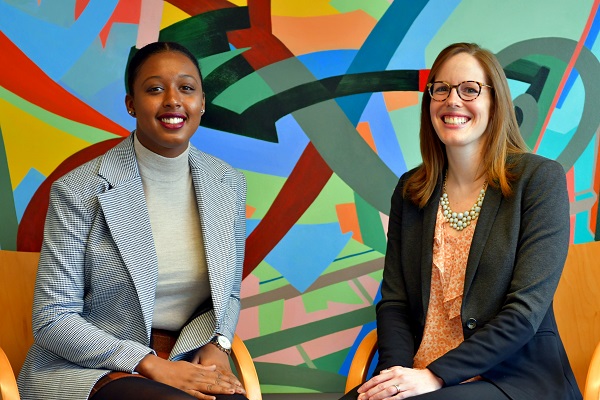Human Rights Office adds two new roles
March 15, 2018
Share
The Human Rights Office has added two new inclusivity-centred positions designed to help remove barriers and build capacity at Queen’s.

In February, Erin Clow (PhD’14) took over the newly-created role of Education and Communication Advisor. Then, in March, Lavie Williams (Artsci'14) was hired as the inaugural Inclusion and Anti-racism Advisor within the Human Rights Office.
“I am pleased to welcome Ms. Williams to the team and congratulate Dr. Clow on her new responsibilities,” says Stephanie Simpson (Artsci’95, Ed’97, MEd’11), Executive Director of the Human Rights and Equity Offices and University Advisor on Equity and Human Rights. “Establishing these positions was a recommendation of the Principal’s Implementation Commission on Racism, Diversity, and Inclusivity (PICRDI) final report, and these two will play a key role in building the climate that the PICRDI group strived to achieve.”
Dr. Clow has worked in the Equity and Human Rights Offices since 2014. This new role will see her supporting the team in developing and implementing training and communication strategies relating to equity and human rights, expanding on her previous responsibilities as an Equity Advisor.
“I am hopeful that we can continue to create educational and training programs that are accessible, thought provoking, and inspiring for members of the community,” she says. “Education and training affords a tremendous opportunity for growth and development, but with that comes responsibility. I am excited to experiment with new learning tools and strategies all in an effort to create relevant, practical, and interesting training and educational programs.”
Ms. Williams, meanwhile, will play a role in developing, implementing, and monitoring institutional inclusion and anti-oppression strategies, with a particular focus on anti-racism and its intersections.
She will also act as a central point of contact for individuals and units who wish to access all related anti-oppression and anti-racism initiatives, processes and services at Queen’s.
“Overall, I hope to collaborate with and empower our community to achieve substantive change,” she says. “I am here as a source of support, advice and assistance for individuals impacted by oppression and exclusion, while also seeking to deconstruct the systems that have built and perpetuate oppressive forces like racism.”
Both see the important role the community must play in order to build a more inclusive Queen’s – through education, continued momentum, and challenging the status quo. Ms. Williams points out there is no “one-size-fits-all” approach to tackling issues of diversity and inclusion, which is why her role will involve spending time with equity-seeking communities and organizations both within Queen’s and externally.
“Aptly, the Anti-Racism Directorate of Ontario defines inclusion as recognizing, welcoming, and making space for diversity," she says. “This definition highlights our duty to support the growth and wellbeing of all. It is imperative that the most vulnerable in our society are protected and assisted in reaching full participation so that we are all able to enjoy and benefit from the true diversity our communities and our world has to offer.”
To learn more about the Queen's Human Rights Office, visit queensu.ca/humanrights. For updates from the Equity and Human Rights Offices, visit the “Together We Are” blog website.